Changes to Japan’s labor laws regarding paid leave have taken effect from April 1, 2019.
Companies are now required to make their employees take 5 days of paid leave during designated periods. This applies to all workers who are granted 10 or more days of leave in one year.
en Japan, a career services company, recently conducted a survey regarding these changes regarding mandatory paid leave. They released the results of this survey, aimed at 610 companies, on May 8th of this year.
According to the results, over 90% of companies were aware of the new mandatory paid leave rule. 70% of those who responded had positive views on mandatory paid leave.
Furthermore, 70% of companies also answered that they are “promoting the taking of time off.” The finance, trading, and IT industries are promoting using paid leave, however, the advertising, distribution, and real estate industries are not. Regarding potential issues arising due to mandatory paid leave, several companies answered “staff shortages” and “uneven work distribution among employees.”
When the results are looked at more closely, 96% of respondents answered that they know about the new changes. Among those 96%, 63% answered “We know the details,” and 33% answered “We know about it roughly.”
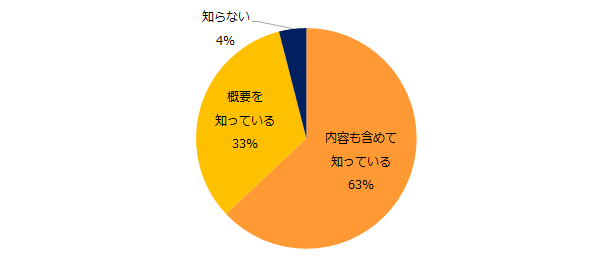 Does your company know about the new rules about mandatory paid leave?
Does your company know about the new rules about mandatory paid leave?When asked about their thoughts regarding mandatory paid leave, 73% of respondents answered that they thought it was good. However, 26% answered that it wasn’t good. As for the reasons behind the positive answers, some respondents were of the opinions that “It’s obviously a right for workers, so a work environment where it’s easier for them to take time off is good,” and “For companies that won’t let workers take time off unless it’s enforced by the law, this is a good chance for them to review their organization systems and workloads.”
However, as for the reasons behind the negative answers, some respondents were of the opinions that “There are a lot of cases where individual workers don’t know when they’ll take time off, so yearly planning will be difficult,” and “If paid leave is mandatory and other work contents and conditions aren’t improved, there’s a risk that unpaid overtime, unpaid work attendance, and taking work home will increase.”
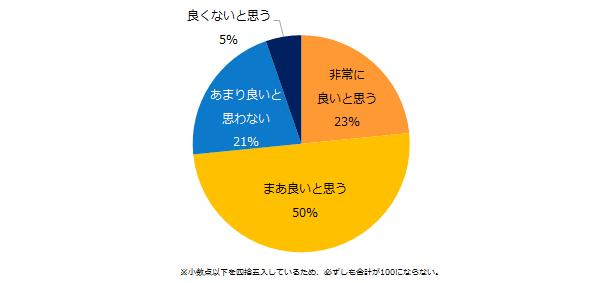 What does your company think about mandatory paid leave?
What does your company think about mandatory paid leave? *The percentages are rounded off by decimal points, so the total is not exactly 100%.
The survey then listed companies that are promoting the new mandatory paid leave rule. In first place were the finance and consulting industries at 100%. Following that, the trading industry was at 79%, with the IT, information processing, and internet industries at 77%. On the other hand, some industries are not promoting mandatory paid leave. Only 36% of companies in the advertising and publishing industries, as well as the mass media, are promoting it. Distribution and retail were at 34%, with real estate and construction at 27%.
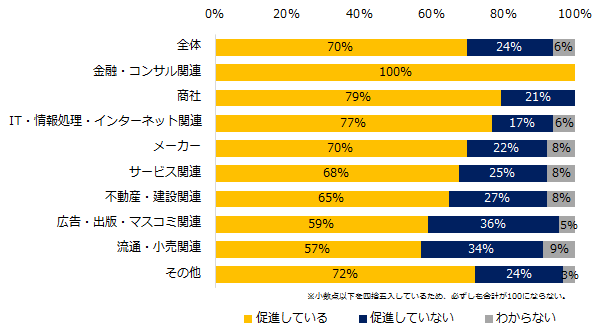 Currently, is your company promoting the new mandatory paid leave rule? (broken down by industry)
Currently, is your company promoting the new mandatory paid leave rule? (broken down by industry)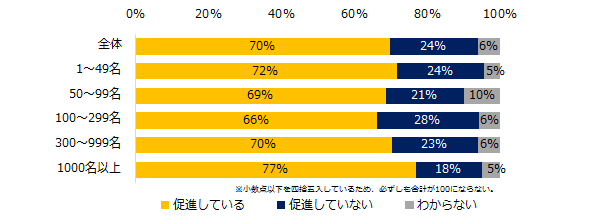 Currently, is your company promoting the new mandatory paid leave rule? (broken down by company size)
Currently, is your company promoting the new mandatory paid leave rule? (broken down by company size)Also, when companies were asked why they were promoting paid leave, the answer “to increase employee satisfaction” was the highest at 67%. Following that, “for employees’ health” was at 58%, and “to comply with the laws regarding mandatory paid leave” was at 42%.
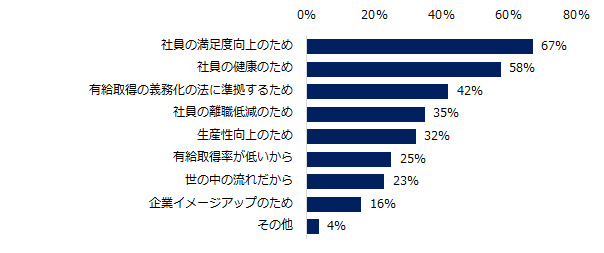 We ask this to those who answered that they were currently promoting the mandatory paid leave rule. What are your reasons for this? (several answers possible).
We ask this to those who answered that they were currently promoting the mandatory paid leave rule. What are your reasons for this? (several answers possible).When asked about difficult points or problems regarding the new rule, many respondents answered “staff shortages” at 65%, and “uneven work distribution among employees” at 60%. From this, it seems that companies who have issues with labor shortages and excessive workloads are concerned about mandatory paid leave.
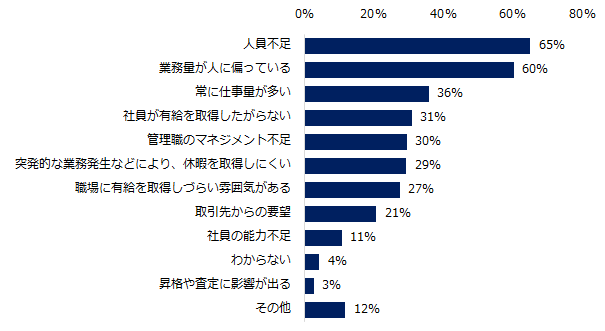 What are some difficult points or problems regarding the implementing of mandatory paid leave? (several answers possible)
What are some difficult points or problems regarding the implementing of mandatory paid leave? (several answers possible)Also, regarding the question “How will your company respond to the new mandatory paid rule?” many companies responded “We will implement plans for having employees take paid leave,” at 83%, as well as “We will let our employees know and educate them on the new rules” at 81%.
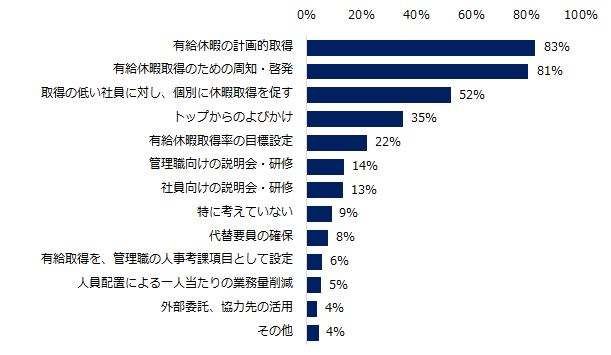 How will your company respond to the mandatory paid leave rule? (several answers possible)
How will your company respond to the mandatory paid leave rule? (several answers possible)This survey was conducted from February to March of 2019. It was an internet survey aimed at 610 companies that use en Japan’s general information site “Jinji no Mikata” (Friend of Human Resources) aimed at HR professionals.



















